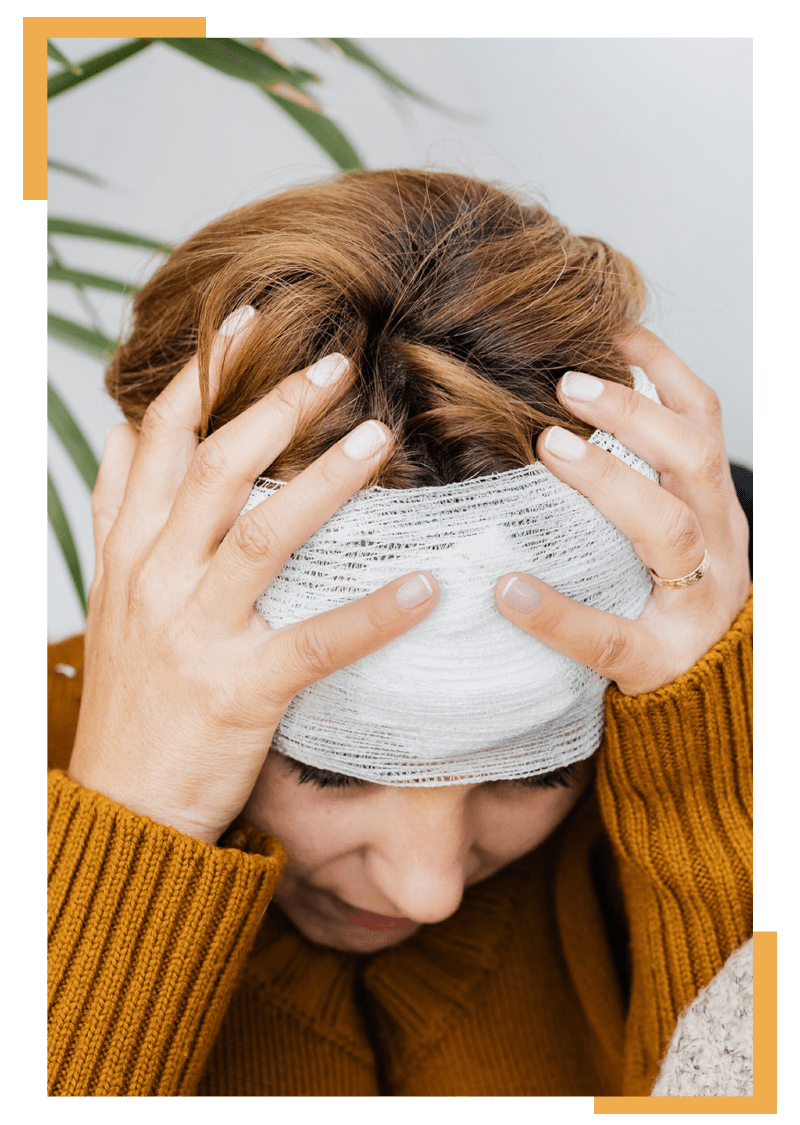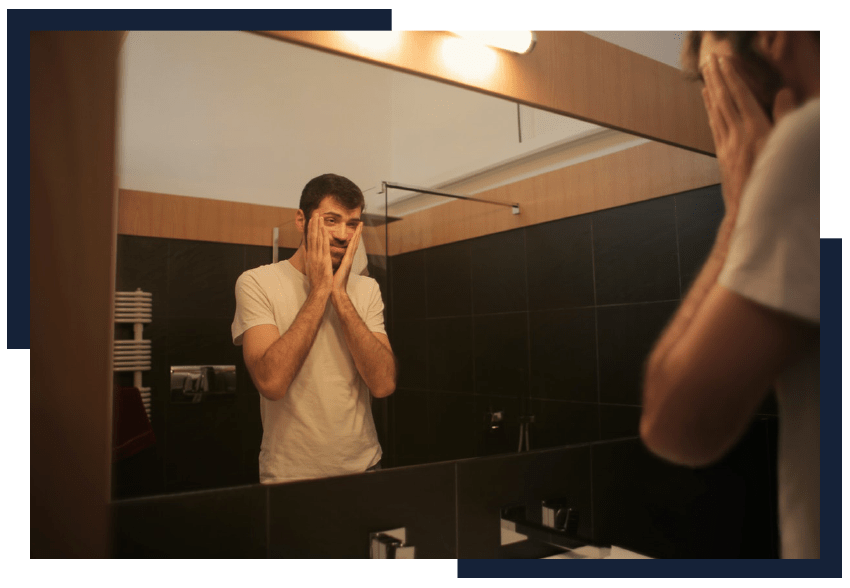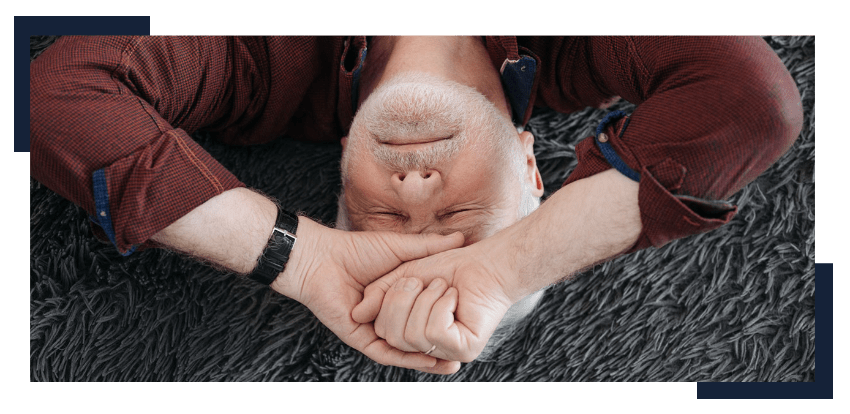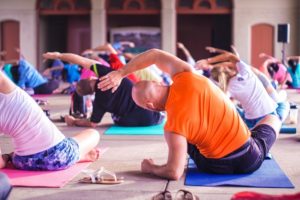Concussion
Concussions can occur without any head contact. A sudden stop, such as falling to the ground or colliding with another player, can cause a concussion. We have designed our concussion therapy program to safely get you back to activity and prevent further chances of suffering a concussion.

What is a Concussion ?
A concussion is typically a short-lived brain injury caused by a bump, blow, or jolt to the head that causes a mild, transient disturbance of brain function. Most concussions occur without loss of consciousness, and the majority do not cause brain swelling or permanent brain injury. Concussions are classified as “mild” brain injuries since they are usually not life-threatening. Even though they’re classified as such, the effects can be serious and last anywhere from days to months.
When a person suffers a concussion, the risk of suffering another concussion may double, triple, or even quadruple. One out of every five head injuries that occur in the United States each year is sports-related. From high-school athletes, more than 50% have reported a history of a concussion. It is usual for someone to recover from a concussion fully.
Concussion symptoms can be subtle and don’t necessarily show up immediately. Symptoms can change over time, making them difficult to manage. As soon as signs and symptoms are observed, it would be best to get an evaluation and begin your course of treatment.
OneRehab’s Concussion Team offers evaluations and management through a collaborative approach of certified athletic trainers, vestibular therapists, and researchers, all dedicated to patient recovery.


Signs & Symptoms of a Concussion
- Temporary loss of consciousness
- Headaches or feeling pressure in the head
- Stints of confusion
- Difficulty remembering the traumatic event
- Dizziness
- Ears ringing
- Nausea/Vomiting
- Slurred speech
- Fatigue
- Sensitivity to light
- Difficulty concentrating
- Personality changes (irritability, nervousness, feeling emotional)
Concussion Treatment
Depending on the severity of the concussion, patients may need shortened school days or workdays. Students should limit schoolwork assignments as they work to recover from the concussion. Trained and vestibular-specialized physical, occupational, and/or speech therapists may work closely with the individual. Referring physician(s), parents, coaches, and employers should ensure the concussed individual is ready to return to activity without fear of long-term deficits.
Initially, limit tasks that require much physical and mental exertion. Avoid activities that increase your symptoms, such as sports, video games, schoolwork, reading, or any physically or mentally demanding activities, until they no longer aggravate you.
Concussion Prevention
Can I prevent the possibility of getting a concussion?
Concussions are not always under an individual’s control, but there are general instructions that you can use to reduce the chances of suffering one.
- Wear a helmet (biking, contact sports, skiing, horseback riding, snowboarding).
- Strengthen the neck muscles.
- Avoid using the head as the primary focal point of contact.
- For older adults: Work to reduce fall risk. Increase core strength and balance, discuss with physician(s) if you are taking medications that make you light-headed/dizzy, have regular vision checks, remove home hazards (i.e., slippery area rugs, cables, clutter).
- Wear a seatbelt every time you’re in a vehicle.
Patient Wellbeing is Our Primary Concern
Get customized concussion therapy to improve your brain function. Contact us.
Concussion Physical Therapy
There is no definite time for recovering from a concussion—however, many people who get a concussion recover within a few weeks. Sometimes, the symptoms can persist for weeks, months, or years. It is a condition known as post-concussion syndrome, and it can frustrate patients.
The symptoms can improve through a combination of cognitive, occupational, physical, or sensorimotor therapies. Traditionally, patients with a concussion were advised to rest and avoid physical activities. However, some exercises after a few days can help reduce the recovery time.
If you are looking for concussion physical therapy services, we have the best therapist. At Onerehab, we design safe exercises to help improve oxygen supply to the brain. As a result, the brain cells have access to more oxygen which promotes protein growth and healing.
Though physical therapy exercises for concussions help increase blood flow, many patients experience exercise intolerance. As a result, you can feel dizzy during or after the exercises. Other symptoms that occur after include headaches, brain fog, nausea, and extreme fatigue.
At OneRehab, we will teach you how to do the exercises safely to avoid these symptoms. Below are some tips that we give you to help you push through with the physical therapy program.
Tolerate the Symptoms to Improve
It is true you will feel bad when you exercise after a concussion. However, it is not permanent. The goal of physical therapy is to retrain your body to respond to exercises appropriately. For this reason, you may need to tolerate the symptoms by allowing short-term discomfort. Do not exert yourself to the point of injury.
When you work with our physical therapists, you will learn to push a little bit and then stop. With time, you increase the number of exercises you can perform.
When you work with our physical therapists, you will learn to push a little bit and then stop. With time, you increase the number of exercises you can perform.
Proper Breathing
If you have post-concussion syndrome, you may have a dysfunctional peripheral nervous system. As a result, your body activates the fight or flight response when your heart rate and blood pressure increases during exercises. Therefore, you need to learn proper breathing techniques to help the “rest and digest” part when exercising. This part helps to lower the heart rate, increase respiration, and preserve energy.
Identify the Point Symptoms Worsen
As you do concussion therapy exercises, you need to know the threshold where the symptoms become worse. For example, you can use a heart rate monitor and note down the point you feel the symptoms increasing. It allows you to notice consistent patterns, such as worsening symptoms when you reach a certain heart rate.
Once you notice where the symptoms worsen, you can exceed it a little bit and then back off. When you exercise at the sub-symptom level builds your endurance without increasing the symptom severity.
Once you notice where the symptoms worsen, you can exceed it a little bit and then back off. When you exercise at the sub-symptom level builds your endurance without increasing the symptom severity.
Take it Slow
Whether you were a pro athlete before the concussion or not active, you need to take it slow. Start with entry-level exercises such as walking on a treadmill or outside for 10 minutes or so. You can Walking up and down the stairs as you gradually increase the exercise duration and intensity.

Cognitive Therapy for Post-Concussion Syndrome
Concussions lead to problems such as attention, memory, word-finding, and executive functioning loss. Cognitive therapy for concussions focuses on these areas, helping patients optimize cognitive skills. Likewise, cognitive remediation therapy helps a patient learn skills to restore and maintain everyday functioning.
According to research, cognitive remediation intervention leads to significant improvement if you have a brain injury. At OneRehab clinic, we use state-of-the-art tools to help patients through this form of therapy. The treatment incorporates processing speed, attention, and memory elements to help you or your loved one.
Memory entails more than the ability to remember things. We acquire information through senses, process it, store it and retrieve it. If you have an issue with any of these steps due to a concussion, it can affect short-term or long-term memory.
Memory entails more than the ability to remember things. We acquire information through senses, process it, store it and retrieve it. If you have an issue with any of these steps due to a concussion, it can affect short-term or long-term memory.
Memory entails more than the ability to remember things. We acquire information through senses, process it, store it and retrieve it. If you have an issue with any of these steps due to a concussion, it can affect short-term or long-term memory.
Post-concussion cognitive therapy exercises help each element of this process. As a result, you reduce your dependency on compensatory strategies. During a session, the therapist will focus on exercises to boot your short-term and long-term memory. This form of concussion therapy is based on the idea that the brain can be physically changed (neuroplasticity).
You can form new neural pathways and synapses once exposed to various environments. Below are some of the elements of cognitive rehabilitation:
- Cognitive rehabilitation focuses on optimizing functioning and relearning how to do daily learning activities through goal-oriented, time-limited therapy.
- This treatment uses psychotherapy to support you or a loved one when you experience emotions related to the concussion.
- Attention enhancing exercises that engage both visual and auditory skills. These exercises help you to retain information and recall, which improves memory.
- Exercises that improve capacity for retention, working memory, and overall mental capacity.
Balance Therapy
After a concussion, therapy can also entail balance. It is also known as vestibular therapy. Vestibular therapy for concussions helps address dizziness. Your physical therapist design activities to help encourage balance and stability hence reduce disorienting symptoms.
Call us today to discuss the best practices for you to reduce your chances of getting a concussion with an expert.
OneRehab
1761 International Pkwy Suite 135, Richardson, TX 75081, United States
Email Us
info@onerehab.com
Call Us
972 845 7875
Working Hours
M - F 7:00 AM – 7:00 PM
Sat 8:00 AM – 2:00 PM



